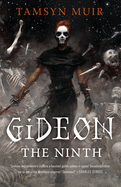
In her debut novel, Tasmyn Muir positions her protagonist, Gideon Nav, amid foreboding gothic spaces and reanimated skeletons. It would be a stretch to describe Gideon as grounded--her awe-inspiring talent as a swordswoman is on repeated display--but she is perfectly happy to puncture the stuffy, self-serious air of her companions with crude jokes, puns and even a well-timed "that's what she said."
The novel's action kicks off when Gideon finally receives a chance to leave her oppressive home planet as a cavalier, a kind of bodyguard. The Emperor has summoned representatives from the nine houses--a necromancer and a cavalier from each--to a huge, decaying palace where the houses will vie against each other to discover ancient necromantic secrets and attempt to become Lyctors, demigod-like members of the Emperor's inner circle. It's complicated. Thankfully, Muir grounds the strangeness in a few familiar conceits. When necromancers and cavaliers start to die in mysterious fashion, the novel begins unexpectedly to resemble a locked-room mystery, or perhaps even a particularly demented slasher movie.
The crux of the novel is the relationship between Gideon and her necromancer, Harrowhark Nonagesimus. Gideon and Harrowhark have carried on a vicious, sometimes violent feud since they were children, with its roots in a horrible tragedy. Despite their antagonism, they have an undeniable emotional connection, and much of the book's most interesting character work lies in deepening and complicating their relationship.
When it comes to epic fantasy, it's difficult to imagine a more purely fun read than Tasmyn Muir's Gideon the Ninth. --Hank Stephenson, bookseller, Flyleaf Books, Chapel Hill, N.C.

